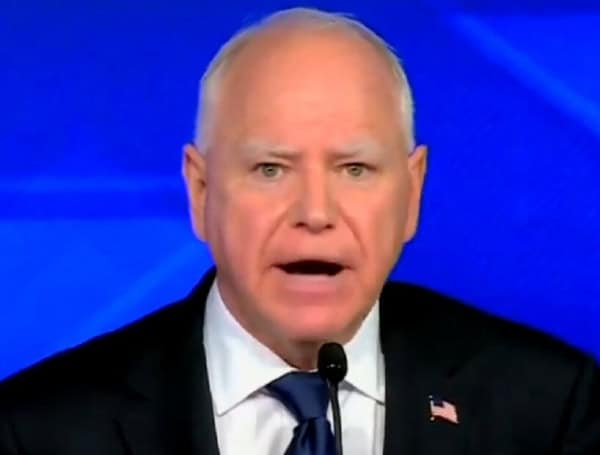Democratic Minnesota Governor Tim Walz faced scrutiny during the vice presidential debate against Republican Ohio Senator J.D. Vance when asked to clarify his previous claims of being in Hong Kong during the Tiananmen Square protests in 1989. Despite earlier statements suggesting he was in the region during the historic protests, reports from Minnesota Public Radio and other outlets have shown that Walz did not travel to Asia until several months later.
When the debate host confronted Walz about the timeline discrepancy, he responded by discussing his background rather than directly addressing the issue.
Read: Israeli Prime Minister Benjamin Netanyahu Vows Retaliation Against Iran For “Big Mistake”
“Well, and to the folks out there who didn’t get at the top of this, look, I grew up in small rural Nebraska, a town of 400, a town that you rode your bike with your buddies till the street lights come on, and I’m proud of that service,” Walz began. “I joined the National Guard at 17, worked on family farms, and then I used the GI Bill to become a teacher, passionate about it, a young teacher. My first year out, I got the opportunity in the summer of ’89 to travel to China.”
Walz shifted to reflect on his contributions to his community, acknowledging he is not without faults but emphasizing his dedication.
“I will be the first to tell you, I have poured my heart into my community, I’ve tried to do the best I can, but I’ve not been perfect, and I’m a knucklehead at times, but it’s always been about that,” he said.
The governor also used the moment to criticize former President Donald Trump’s handling of U.S.-China relations, suggesting that his own experiences in China would have led to better policy decisions.
“I guarantee you he wouldn’t be praising Xi Jinping about COVID, and I guarantee you he wouldn’t start a trade war that he ends up losing,” Walz added.
However, when pressed further by the moderators to explain the timeline discrepancy, Walz conceded that he may have misspoken.
“No, just all I said on this was I got there that summer and misspoke on this. So I will just, that’s what I’ve said,” he admitted. “So I was in Hong Kong and China during the democracy protest went in. And from that, I learned a lot of what needed to be in governance.”
Critics have highlighted Walz’s ties to China, including his honeymoon in the country and his marriage on the anniversary of the Tiananmen Square massacre. Some China experts have questioned these connections as Walz rises in political prominence.
Tim Walz’s Extensive Ties to China Come Under Scrutiny Amid New Revelations
Walz previously claimed he had visited China 30 times, a statement that his campaign later walked back, clarifying that the governor had actually visited around 15 times. From 1992 to 2003, Walz traveled to China nearly every summer, even “honeymooning” there in 1994, coinciding with the fifth anniversary of the Tiananmen Square massacre—a date Walz said he chose because “he wanted to have a date he’ll always remember.”
While in China, Walz taught a course approved by the Chinese Communist Party (CCP) in the years following the Tiananmen Square massacre. His company, Education Travel Adventures (ETA), benefited from subsidies provided by the Chinese government, which sponsored student accommodations and transportation during the exchange programs he organized.
Walz has often praised China, stating that he was “treated better there than anywhere else” and that the country had “almost no crime.” One trip, he recalled, was a “15-day adventure of a lifetime.” His time in China also led him to learn the language, as Walz has stated, “I’ve lived in China and speak Chinese, I’m pretty friendly with China.”
However, Walz’s close relationship with China has drawn criticism, particularly given his ties to Minnesota Global, a Twin Cities-based nonprofit organization that allegedly houses a Chinese police station. Despite growing concerns, Walz has not taken steps to shut down the facility during his time as governor.
Walz has also raised eyebrows with his stance on U.S.-China relations. He has repeatedly stated that he does not see China as an adversary, despite the FBI identifying China as the greatest espionage threat to the United States. In 2019, Walz criticized former President Donald Trump’s tough trade policies toward China, calling instead for policies that would prioritize relations with Beijing.
As more details of Walz’s connections to China come to light, questions continue to swirl around the depth of his ties and the impact they may have on his political future. Critics argue that his friendly stance toward China raises concerns at a time when U.S.-China relations are under intense scrutiny, while his supporters defend his efforts to foster international relations.
Please make a small donation to the Tampa Free Press to help sustain independent journalism. Your contribution enables us to continue delivering high-quality, local, and national news coverage.
Android Users: Download our free app to stay up-to-date on the latest news.
Connect with us: Follow the Tampa Free Press on Facebook and Twitter for breaking news and updates.
Sign up: Subscribe to our free newsletter for a curated selection of top stories delivered straight to your inbox.



